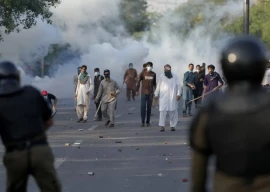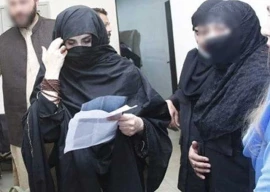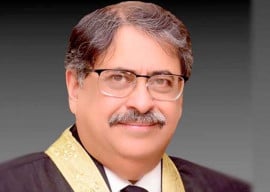
The 18th Speakers Conference on Friday called for resolving disputes and common challenges through dialogue and stressed the need for taking effective measures to counter terrorism, combat fake news, and address negative trends on social media.
The unanimous joint declaration issued at the conclusion of the two-day conference, detailed 23 decisions aimed at promoting parliamentary values, ensuring transparency in legislation, addressing public grievances, upholding the Constitution, and tackling challenges such as climate change.
The conference was chaired by National Assembly Speaker Ayaz Sadiq, and attended by Deputy Speaker Ghulam Mustafa Shah, Senate Chairman Yousuf Raza Gilani, as well as the speakers of the four provincial assemblies, the Azad Kashmir Legislative Assembly, and the G-B Assembly.
It was decided in the conference that the scope of the Pakistan Institute for Parliamentary Services (PIPS) would be extended to assist AJK and G-B. It was also decided that the 19th Speakers' Conference would be held in Muzaffarabad, AJK, next year.
The conference declaration stated that the participants urged upholding the Constitution as the supreme law of the country, ensuring its effective implementation, resolving ambiguities through dialogue, and countering violations by state and non-state actors.
The declaration stressed the urgent need to restore public confidence in legislative processes through accountability and transparency, strengthen the connection between the executive and the public, and address the public issues by effectively utilising legislative oversight and representatives' powers.
The forum called for aligning provincial government regulations with constitutional principles to ensure executive accountability, parliamentary oversight of relevant ministries, and respect for the Constitution's mandate.
Concerns were raised about the increasing use of derogatory language, fake news, and accusations on social media, which fostered divisiveness and hindered constructive dialogue. The declaration called for fostering a culture of decency, civility, and respect for differing opinions.
The forum identified climate change, rapid technological advancements, socio-economic inequalities, and evolving public needs as key challenges. The declaration underscored the importance of parliamentary diplomacy for advancing regional and international peace and cooperation.
The forum pledged to prioritise climate change through legislative and policy actions; enhance efforts for comprehensive legislation and policies to combat terrorism; and, improve legislative performance, harmonisation of rules across all legislative bodies.
The meeting resolved to adopt modern technologies, including artificial intelligence and digitisation, to improve parliamentary efficiency. It agreed to a proposal for the establishment of a national association of public accounts committees (PACs) to enhance financial oversight and transparency.
It also stressed collaboration with all societal sectors, including educational institutions, media, civil society, and NGOs, to enhance parliamentary performance and address key issues such as SDGs, youth empowerment, and child rights.

1734765764-0/Untitled-(3)1734765764-0-405x300.webp)
1734764416-0/Untitled-(1)1734764416-0-165x106.webp)





1734764238-0/Untitled-design-(52)1734764238-0-270x192.webp)







1734587529-0/Express-Tribune-(1)1734587529-0-270x192.webp)
1734606611-0/Express-Tribune-(8)1734606611-0-270x192.webp)






COMMENTS
Comments are moderated and generally will be posted if they are on-topic and not abusive.
For more information, please see our Comments FAQ